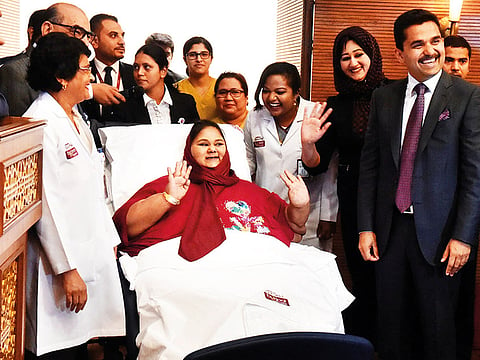Eman Abdul Atti, once known as 'world’s heaviest woman', dies
Eman Abdul Atti died at 4.35am on Monday due to complications from heart disease and kidney dysfunction: doctors

Eman Abdul Atti, once known as the “world’s heaviest woman alive”, passed away on Monday morning.
The 37-year-old Egyptian, who was treated at Burjeel Hospital, passed away at 4:35 AM on Monday, according to a statement from the hospital.
She succumbed to “complications from underlying comorbid conditions, including heart disease and kidney dysfunction,” the statement said.
Comorbid conditions
Comorbid conditions are those which occur simultaneously with a primary disease; in Abdul Atti’s case, she was primarily suffering from obesity.
According to Dr Nabeel Debouni, the hospital’s medical director, Abdul Atti had shown much improvement since her admission to Burjeel in May.
“But her condition had deteriorated in recent days,” he added, without disclosing the exact cause of death.
He added that arrangements would soon be made to repatriate Abdul Atti, and added that reports about Abdul Atti suffering a septic shock and subsequent multi-organ failure were untrue.
The hospital said Abdul Atti’s family has “expressed appreciation for the care and treatment provided by the hospital…and were also grateful to the rulers and the people of the UAE for their support”.
In turn, the hospital also expressed its heartfelt condolences to the family.
Her sister Shaima Selim did not respond to request for a comment from Gulf News.
Abdul Atti was bedridden for years in the Egyptian town of Alexandria, and her plight first came to light when her family issued an online plea for help.
She had supposedly not left her home for 25 years, and had been confined to the bed for year after suffering from a stroke.
The family accepted an offer for treatment from Mumbai-based Saifee Hospital and Abdul Atti was flown to the facility in February. Doctors there said she initially weighed about 500 kilograms.
Bariatric surgery
She then underwent bariatric surgery in March, but a dispute about her subsequent treatment and weight loss led the family to opt for further treatment at Burjeel.
A team of top specialists from Burjeel then flew to Mumbai to work out the logistics of Abdul Atti’s bed-to-bed transfer to the UAE.
They were accompanied by Dr Shamsheer Vayalil, chairman and founder of VPS Healthcare, Burjeel’s parent company, and Dr Shajir Ghaffar, chief executive officer for VPS in the Dubai and Northern Emirates.
Abdul Atti was finally medically evacuated from Mumbai, and brought to the UAE on May 4 along with her sister, Shaima Selim.
Upon her arrival, she was admitted to the intensive care unit and a team of 20 medical professionals assessed her condition.
At a follow-up press conference, they explained that Abdul Atti was suffering from obesity, a defective heart valve and deformities in her knee and hip joints.
However, the medical team prioritised the treatment of some urgent medical conditions Abdul Atti was facing, including a fever, severe bedsores, urinary tract infection, and speech and mental well-being-related concerns.
A panel of advanced workup was also sent to Germany to determine if any genetic conditions were responsible for Abdul Atti’s obesity.
Leptin receptor deficiency
Dr Yassin El Shahat, chief medical officer at Burjeel, later told Gulf News that Abdul Atti suffered from a congenital leptin receptor deficiency.
Leptin, known as the satiety hormone, helps signal to the body that it is full.
In the rare cases in which a patient is deficient in leptin receptors, the brain does not receive the signal that a person is satiated; the patient therefore constantly feels hungry and keeps eating.
Still, in all previous statements, the hospital said Abdul Atti had shown significant improvement since her arrival.
Dr El Shahat had said that in the initial phase, a conservative treatment method was being used, including the reduction of her daily intake to 800 calories.
A video released in June showed her moving her arms, and being orally fed after the removal of nasogastric tubes.
Later that month, a statement said she was able to feed herself, and could sit in a specially customised wheelchair for long periods.
Abdul Atti finally met with the press in late July, dressed in resplendent red and with a smile on her face.
Dr Vayalil and Dr El Shahat testified to the remarkable improvement in her mental condition, and said the second stage of treatment, which would include liposuction and excess skin removal, was likely to begin in August.
A planned trip to the Corniche in August, Abdul Atti’s first outside the hospital, was, however, cancelled by the hospital citing unfavourable weather.
She then celebrated her 37th birthday at the hospital on September 9, and her mother flew down to join the festivities.
Selim, on the other hand, has remained by her sister’s side throughout her treatment.
Sign up for the Daily Briefing
Get the latest news and updates straight to your inbox



